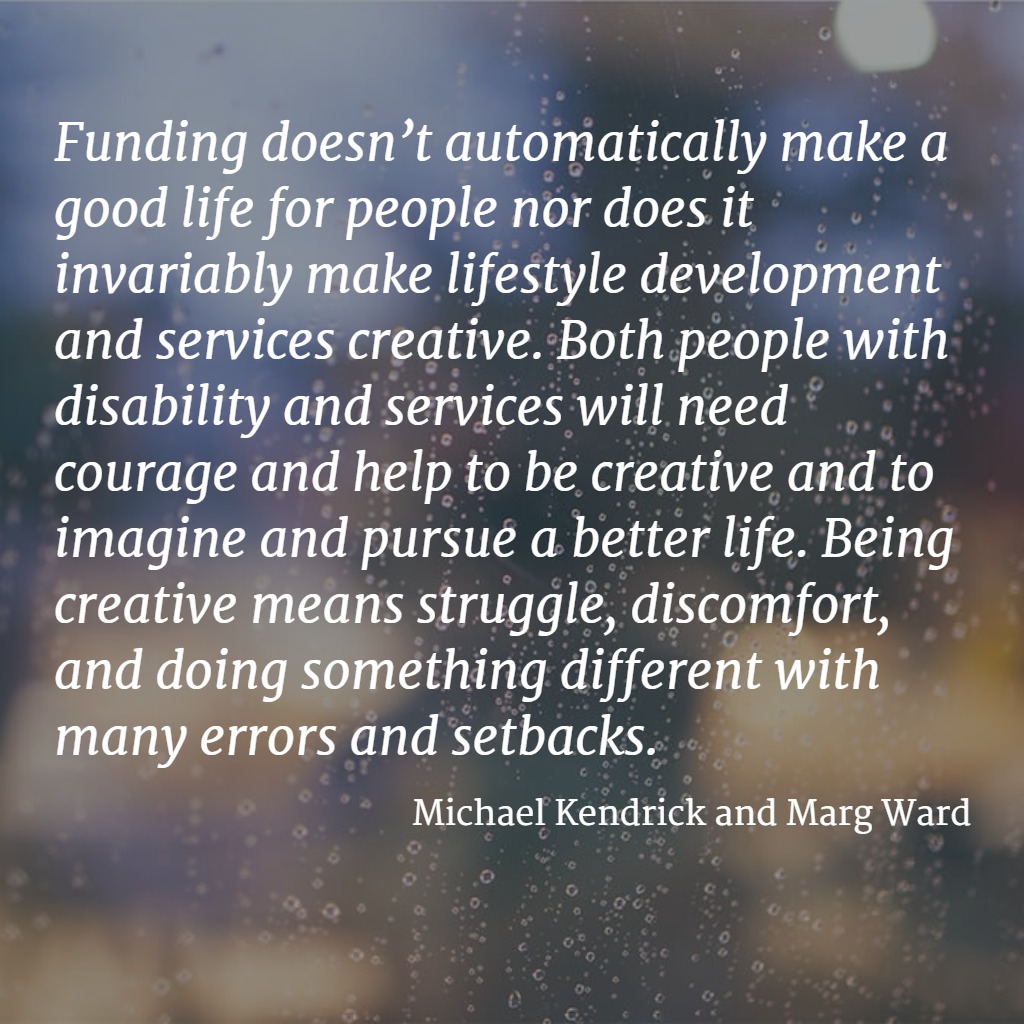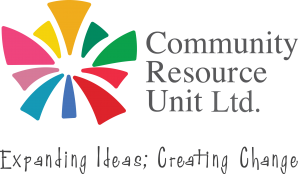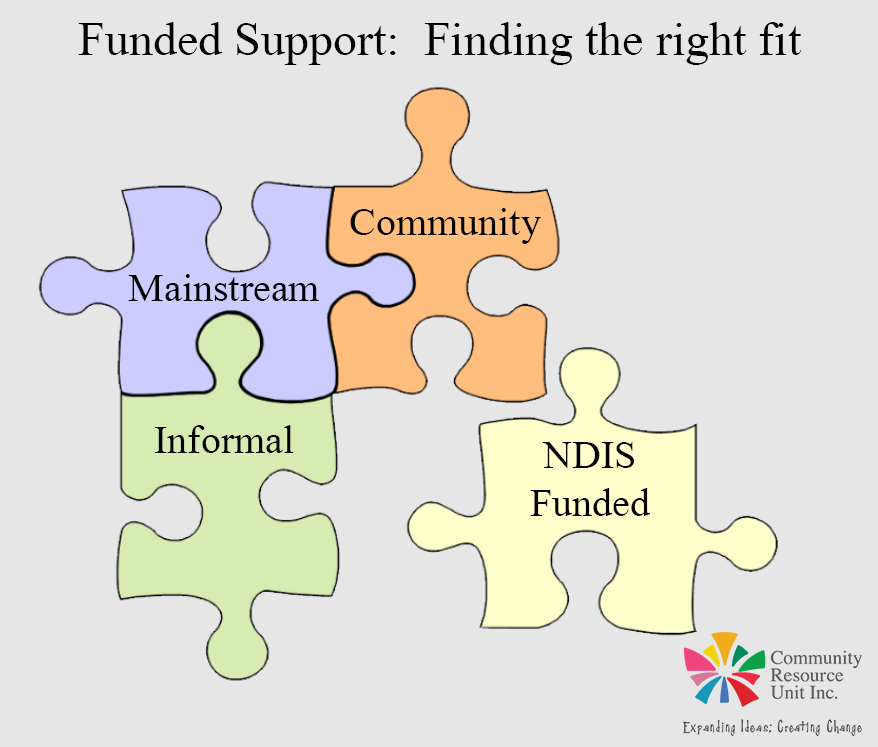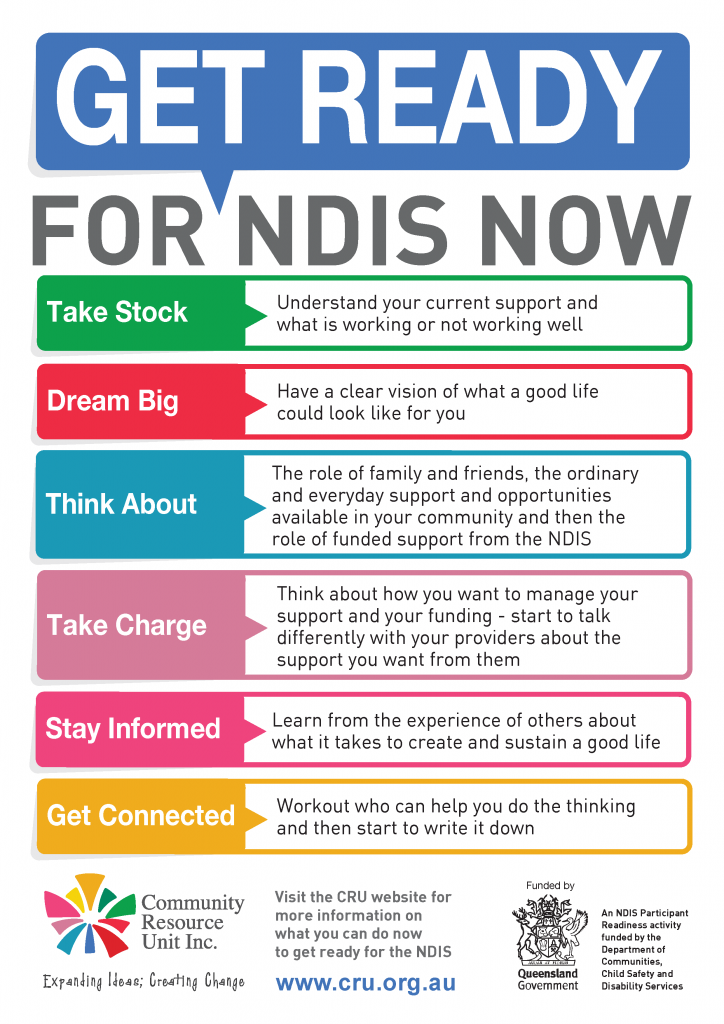CRU welcomes the reform to the existing disability service system through the introduction of the National Disability Insurance Scheme (NDIS) to Australia. In this section we will discuss how the opportunities provided by the NDIS can be used in the pursuit of the good life. We are building on the ideas discussed in the first three pages and applying them to the NDIS.
Such a big change brings opportunity and each of us needs to engage both our head and our heart to understand what is most likely to lead to real and lasting positive change for Australians with disability.
In this page we will…
New Opportunities for the Good Life
In 2016, CRU ran a series of one day forums around Queensland in which people with disability and families who are accessing the NDIS could share their experiences of the scheme. The following films are from those events.
Presenters came from NDIS trial sites in New South Wales, The ACT, Victoria, South Australia and Western Australia. All presenters either lived with disability themselves or were family members of people with disability and the stories shared covered young children through to adults.
Presenters shared their experience of:
- Getting ready for the NDIS
- Creating a vision and planning for a good life
- Self-directing and self-managing
- Staying well connected in their community
- Day-to-day experience of the NDIS
All of the presenters self-directed their supports with varying degrees of self-management and all reflected on the benefits to have more choice and more control over how and why supports were provided and how when and by whom they were being provided.
THE NDIS: WHAT, WHY, WHO AND WHEN
Information about the NDIS
The National Disability Insurance Scheme (or NDIS) is a new way of providing individualised support in Australia for people with a permanent and significant disability that affects their ability to take part in everyday activities.
The NDIS is a national scheme which will be implemented by the National Disability Insurance Agency (NDIA). The eight state and territory schemes and a range of commonwealth funded initiatives will be replaced by a simpler and fairer nation-wide approach.
Australians who meet the access requirements can receive reasonable and necessary support to access community services and activities. During the transition phase it will be important to understand your current support, which may be received from a variety of programs.
The benefits of the new scheme are:
- transportability – as a national scheme funded support will be recognised if you move interstate
- reasonable and necessary support will be available across a lifetime
- greater certainty and predictability of support.
How a forty year old proposal became a movement for change
Mike Steketee
![]() Rather than governments giving fixed grants to service providers, funding is allocated on the basis of individual needs calculated over a lifetime. The insurance-based approach creates incentives to minimise costs by favouring early intervention and access to education and training to maximise long-term independence.
Rather than governments giving fixed grants to service providers, funding is allocated on the basis of individual needs calculated over a lifetime. The insurance-based approach creates incentives to minimise costs by favouring early intervention and access to education and training to maximise long-term independence.
How does the NDIS work?
The NDIS is a form of “social insurance” where the government meets the costs of the scheme. This is similar to the Medicare system which provides basic health services for all Australians. Funding for the scheme will come from existing Commonwealth and State disability funding as well as the increase in the Medicare Levy which started in July 2014.
As in other insurance schemes the NDIS will consider costs and outcomes over a person’s life-time; invest in early intervention, research and innovation to help reduce the needs and costs and build community capacity and social capital and develop preventative strategies.
The core vision and goals of the NDIS are to:
- Enable people with a disability to be in control and have choices
- Maximise participant’s independence and social and economic participation
- Build a world class scheme that is financially sustainable.
Fact sheets in languages other than English
National Disability Insurance Scheme (NDIS)
The NDIS has translated information about the NDIS into multiple languages other than English. Resources will continue to be added to this page as they become available
Amparo Advocacy (Queensland)
Amparo Advocacy has developed 2 fact sheets on the NDIS and these have been translated in to 30 languages.
The worksheets are titled “Understanding Disability in Australia” and “What is the National Disability Insurance Scheme (NDIS)?”
Receiving Support from the NDIS
There are two main ways you can receive support from the NDIS. The first is through Individualised Funding packages and the second is through Information, Linkages and Capacity Building (ILC). In order to receive individualised support you will need to go through an individual planning and assessment process. The definition of what is reasonable and necessary is defined in the legislation that underlies the NDIS.
In order to be considered reasonable and necessary a support must:
- be related to the participant’s disability
- not include day-to-day living costs that are not related to a participant’s disability support needs
- represent value for money
- be likely to be effective and beneficial to the participant, and
- take into account informal supports given to participants by families, carers, networks, and the community.
An Individualised Funding package is where the NDIS agrees to fund supports for person with disability. This funding is based on what is considered ‘reasonable and necessary’ in order to maximise an individual’s independence and social and economic participation. It is these Individualised Funding packages that will fund things like:
- daily personal activities, e.g. showering and grooming
- transport to enable participation in community, social, economic and daily life activities
- workplace help to allow a participant to successfully get or keep employment in the open or supported labour market
- therapeutic supports, including behaviour support
- help with household tasks to allow the participant to maintain their home environment, e.g. cleaning, meal preparation
- help to a participant by skilled personnel in aids or equipment assessment, set up and training
- home modification design and construction
- mobility equipment, e.g. wheelchair, mobility scooter, hoists etc.
- vehicle modifications, e.g. swivel seat, grab bar, ramps, wheelchair lift, postural support etc.
The second branch of NDIS funded support is through a broader program called Information, Linkages and Capacity Building (ILC). This program is designed to assist people to connect with existing mainstream and community supports. People who are not eligible for for individually funded support may be able to access ILC supports. It will also work with the community to promote inclusion and improve the response of mainstream systems to the needs of people with disability.
PREPARING YOUR PLAN FOR THE GOOD LIFE
You can start now!
A key learning from the NDIS trial sites is that the more thinking and preparation you do the easier it will be to have a conversation with the NDIS planner. The NDIS refers to this as being ‘plan ready’ – which means being clearer about what you want your life to be like and what is important for you. This will make it easier for you to identify the support you might need to live a Good Life in your community.
 For more ideas about how to get ‘plan ready’, please visit the PLANNING section of page 2 of this website.
For more ideas about how to get ‘plan ready’, please visit the PLANNING section of page 2 of this website.
Like the Beatles said, money can’t buy me love
Jane Sherwin
![]()
The sort of riches that NDIS might help with is not about the size of the grant but rather the richness of life’s experiences that can be made possible. Shifting from a focus on money to a focus on a bright future will be a worthwhile path.
Think and Prepare
NDIS Step 1
![]()
The overwhelming piece of advice from the trial sites is – make sure you give a lot of consideration to what you want, think outside the box and make sure you have a vision for how you want to live your life before you even get to that first NDIS meeting.
MANAGING YOUR NDIS FUNDED SUPPORTS
Taking Charge and Staying in Control
The NDIS is designed to be flexible so that people can decide what parts of their support they want to be in charge of themselves and what they would like other people to help them with. For people looking to direct their own supports there will be greater freedom to choose the way they receive their support, but it will also mean they have more responsibility for how they spend their funding.
A major change with the NDIS will be that funding does not have to go directly to service providers. Funding is allocated to the person and they choose how to manage the funds; some people will ask existing providers and companies to deliver a service for them but there are also other options.
No matter what they choose, the people with disability will remain in control of which provider they select to provide various supports, when support is provided and how that support is provided.
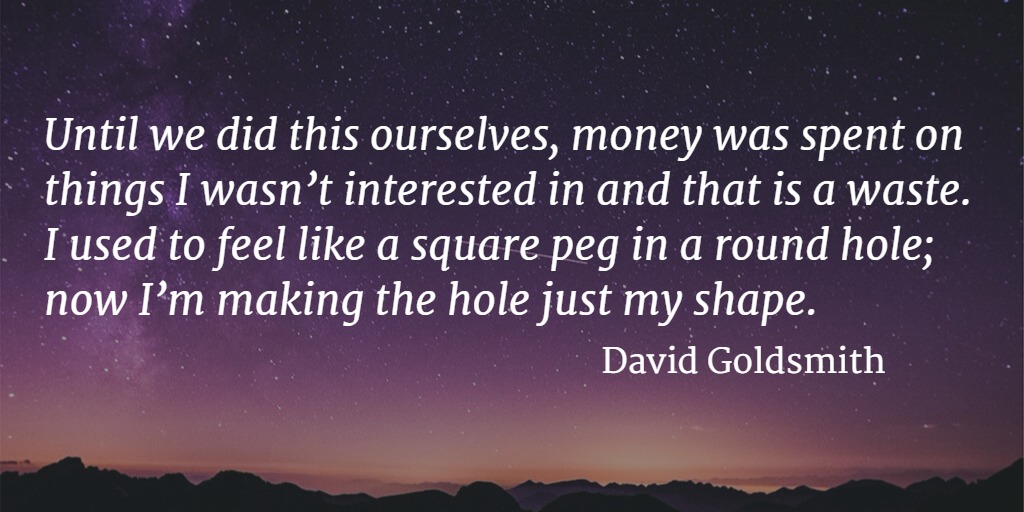
Self-managing your NDIS funding
The NDIS developed a guide to self-management for people who are self-managing, or interested in self-managing their NDIS funding. This guide will help people understand the benefits of self-management, roles and responsibilities and how to self-manage effectively.
This web page includes all of the resources and forms required to self-manage as well as an outline of the benefits and responsibilities of self-managing your NDIS funded supports, as well as the purchasing guide.
Managing your NDIS funded supports
1. Self Managed (including by a plan nominee)
You (or your nominee) choose who provides you with support, even if they are not registered with the NDIS; however you will be responsible for sourcing, arranging and paying for those supports. You will be responsible for keeping adequate records and reporting your expenditure to the NDIS.
3. The National Disability Insurance Agency (NDIA)
The Agency pays providers on your behalf, you must receive support from registered support providers and enter into a service agreement with them as to how and when supports are to be delivered.
2. Registered plan management provider
You can employ a registered plan management provider to manage some or all of the funding of supports in your plan; you do not have to receive supports from registered support providers. The plan management providers can undertake financial intermediary activities, or financial and service intermediary activities.
4. Combination of all three
You can choose a combination of these that best suit your needs and situation. This can be changed as your situation changes.
IMPORTANT INFORMATION ABOUT THE NDIS
The Broader Context of this New Scheme
It is important to note that many of the core details about how the NDIS will work are still being reviewed and evolving. It may be helpful to consider the ideas that have shaped the overall purpose of the scheme and the issues it is looking to address.
In this section we will explore the history of the NDIS, the overall strategy for change that the NDIS fits in to and importantly, your rights within the new system and how to uphold them.
The History of the NDIS
The NDIS was born from grassroots campaigns and reports which showed the current disability services system was inequitable and fragmented and that many people with a disability were missing out on the supports they needed. Governments were also concerned that the current system was not economically sustainable.
In 2011 the Productivity Commission recommended major reforms to disability services across Australia to address these issues. In 2012 the Commonwealth Government approved the introduction of the NDIS as part of these reforms and in the following year the NDIS Act 2013 legislation was passed.
Change Agents: Rhonda Galbally and Bruce Bonyhady on the birth of the NDIS
Ideas the Shape the NDIS
Convention on the Rights of Persons with Disabilities
United Nations
Shut Out Report
Commonwealth Department of Social Services (DSS)
Disability Care and Support
Australian Productivity Commission.
This report is available in an Easy English Version
The National Disability Strategy
The NDIS is part of the Australian Government’s National Disability Strategy. Launched in 2011, this 10 year strategy aims to improve the lives of people with disability, their families and carers. The NDS has identified 6 policy areas to target the change required and these are outlined within this section.
There are significant barriers to people with disability taking their rightful place in society. The strategy acknowledges that the blocks and barriers that exist are large, complex and require a significant change not only in the way government services are offered, but also from the broader community.
Read the Strategy
All files are from the Australian Government’s Department of Social Services website
The policy areas of the National Disability Strategy
1. Inclusive and accessible communities
the physical environment including public transport; parks, buildings and housing; digital information and communications technologies; civic life including social, sporting, recreational and cultural life.
2. Rights protection, justice and legislation
statutory protections such as anti-discrimination measures, complaints mechanisms, advocacy, the electoral and justice systems.
3. Economic security
jobs, business opportunities, financial independence, adequate income support for those not able to work, and housing.
4. Personal and community support
inclusion and participation in the community, person-centred care and support provided by specialist disability services and mainstream services; informal care and support.
5. Learning and skills
early childhood education and care, schools, further education, vocational education; transitions from education to employment; life-long learning.
6. Health and wellbeing
health services, health promotion and the interaction between health and disability systems; wellbeing and enjoyment of life.
Your Rights and the NDIS
The NDIS aims to provide people with disability with greater choice and control and to help exercise this choice and control it will be useful understand the rights available to them. This will include a range of rights through the NDIS scheme, as well as the broader consumer rights available to all Australians.
For example, if you are not happy with the outcome of your NDIS planning process you can:
- ask for your plan to be reviewed.
- provide feedback or make a complaint.
- ask for important decisions, like eligibility for the scheme or what is reasonable and necessary support for you, to be formally reviewed.
Similarly, if you purchase a service or a piece of equipment you will covered by broader consumer laws.
From time to time people with disability may need advice and support to exercise their rights. This can be through the assistance of trusted family and friends as well as through the use of formal advocates. We will be exploring this issue in one of the upcoming pages of this website.
The NDIS Quality and Safeguards Commission
The NDIS Quality and Safeguards Commission is an independent agency established to improve the quality and safety of NDIS supports and services.
This commission regulate NDIS providers, provides national consistency, promotes safety and quality services, resolve problems and identify areas for improvement.
The NDIS Quality and Safeguards Commission has information on available in an increasing selection of languages and formats. To find out more, go to their ‘in your language‘ page.
Useful Resources
Direct and Indirect Discrimination
Disability Advocacy Resource Unit (DARU)
What if I am not happy with the NDIS – Easy English Version
My Choice Matters
The Appeals Process
NDIS Appeals
Commonwealth Department of Social Services (DSS). The Government body funding NDIS appeals.
Feedback and Complaints
National Disability Insurance Scheme (NDIS)
NDIS Appeals providers in Queensland
Queensland Advocacy Incorporated (QAI)
Brisbane based. Working state-wide
Speaking Up For You (SUFY)
Brisbane based. Working in South East Queensland
Independent Advocacy Townsville
Townsville based. North Queensland.
Rights in Action
Cairns based. Working in Far North Queensland
People with Disability Australia
Bundaberg based. Working statewide
For other areas visit Disability Advocacy Pathways. Pathways is an information and referral service for Queenslanders with disability, their family, friends, and carers to find advocacy services to suit their needs and location.
Here is a video created by Disability Advocacy NSW, this video offers a short introduction to NDIS review processes. To view the video click here.
STORIES OF SELF-DIRECTING AND TAKING CONTROL
Wisdom From Australia and Around the World
The move towards people with disability and their families having greater choice and control over their funded supports is a global one that has been growing over many decades. We believe we can learn from the experience of people in other jurisdictions; both in how people with disability can use their funded support to benefit themselves and their communities in the best way possible but also to how we can prepare and safeguard against the likely challenges that will arise.
The Erosion of Individualised Funding
Bruce Uditsky
![]()
‘Individualised funding’ is not a panacea; nor is it a power unto itself… It provides a mechanism by which families and creative service providers in the future will be able to step outside today’s traditional human services. Individualised funding can support the possibilities of tomorrow’s vision
Building Something from Nothing
Libby Ellis
![]()
On reflection, the most important part of this early stage of change was just running with the pure belief even though we had no personal evidence or experience that it would work. We just held to the idea that other people had done it.
Other leaders were telling us it could happen. I would walk around suburbs and stand in front of what I thought were beautiful homes (not necessarily the grandest) and just imagine Matthew in one of them.
Making the Most of This Change
Without a holistic framework and sound thinking, we face a number of risks. We risk:
- focusing on the things immediately in front of us and neglecting other things that may be even more important.
- compromise the critically important things in life that money can’t buy through focussing only on funding and paid service.
- assuming that people with disabilities and families know exactly what they need and that they too don’t need to unlearn old ways and be encouraged and supported to think in a new way about what is possible.
- not having ways to understand the difference between what something is called and what it actually is.
- Following fads and changes that don’t last.
Positive change is critical; it is possible but it doesn’t just happen. We need to understand both the process required for change and also become more discerning about what the change needs to entail if it is actually going to make a difference.
